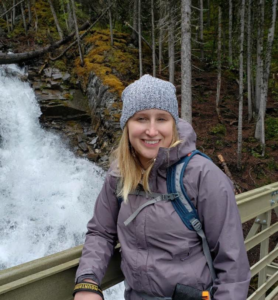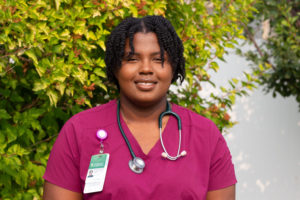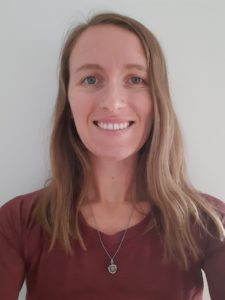The path to becoming a nurse may look different to everyone with the underlying desire often the same—a passion for helping others.
This passion to help was on display during a virtual event “Let’s Go Rural – How Do I Get There?” where three soon-to-be nursing grads from the University of Alberta (U of A) talked about their journey to school and shared how prospective students can succeed on the way to their future career. The event was co-hosted by RhPAP, and the University of Alberta Faculty of Nursing.
Seeking a new career

– Photo supplied by Briana Raffael
Describing her journey to nursing school as “a round-about,” 24-year-old Briana Raffael said that nursing was always in the back of her mind, even when she obtained a bachelor’s degree in kinesiology from the U of A.
“My first degree focused on working with people with disabilities, and helping [others] get active, [but] I realized that I really wanted to work in a medical [environment] rather than recreational,” she explained as to why she went back to school.
“I had an older sister who was a nurse at the time, she worked in the [emergency room] and the [intensive care unit.] I saw what she did and thought that was more my speed. I like that it’s flexible, there are so many different specialties, and so many different ways to be a nurse.”
My first degree focused on working with people with disabilities, and helping [others] get active, [but] I realized that I really wanted to work in a medical [environment] rather than recreational.
-Briana Raffael
Choosing to go to the U of A because it offered an after-degree program, Raffael explained that her degree not only meant that she had most of the prerequisites for the program, but it also helped her throughout her studies.
“Once I was in the program, I felt like I was constantly going back and being like, ‘oh, I understand this concept. I’ve seen this before,’” she shared. “I could relate the nursing concepts to working with clients when I was doing [recreation] opportunities for people with disabilities.”
Although she had previous experience working within health care, Raffael shared that she still faced a steep learning curve as she got further into the program.
“I remember my first clinical shift in the hospital, it was definitely a big culture shock,” she explained. “I had never really worked in a hospital before, or even been in [one]. I think that was one thing I probably would have done differently.
“So, I would give [prospective students] the same advice I’d give myself,” she added.
“Take opportunities to volunteer or shadow and get your foot in the door because that’s all really valuable experience.”

– Photo supplied by Lydia Mutoni
Finding inspiration through volunteering
For Lydia Mutoni, the path to nursing school involved a lot of hard work and determination.
“I always knew [my career] would be [in health care], so I [did] as much science as possible and volunteered as much as possible,” shared the 21-year-old.
“I was just trying to get my foot in the door and learn more about the medical field as a whole.”
Although Mutoni originally had visions of becoming a physician, this all changed when she got a taste of what it was like to work in a hospital.
“I used to volunteer at the hospital every week, probably since the start of high school,” she said.
While doing this Mutoni gained experience working in the cardio unit, surgery unit, and in emergency.
It was amazing to volunteer, and by the end of it I was able to shadow one of the nurses and watch how she interacted with her patients and with doctors. It was a real eye opener just to see her work. She would show up and command the room because she was just so knowledgeable. I loved it!
With a new goal, Mutoni enrolled in nursing school ready to learn, but despite her hard work she faced a steep learning curve that can be common for first-year students.
“It was amazing to volunteer, and by the end of it I was able to shadow one of the nurses and watch how she interacted with her patients and with doctors,” she shared.
“It was a real eye opener just to see her work,” said Mutoni, adding this was truly when she was inspired to become a nurse.
“She would show up and command the room because she was just so knowledgeable.
“I loved it!”
Determined to succeed, Mutoni said that reaching out to others helped to get her through it, something she said others shouldn’t be too proud to do.
“Just because you’re smart doesn’t mean you can’t ask for help,” Mutoni expressed, noting that professors admitted that very few students take advantage of their wiliness to help.
“The office hours I went to were amazing, [the professor] literally sat there and taught me (one-on-one) the things I was having trouble with.”
“University is expensive and if I had failed how sad would it have been to realize I had all of these opportunities and I just said ‘no.’
“Take advantage of everything.”
Let passion drive you

– Photo courtesy of Bailey Artym
Soon to be nursing graduate, Bailey Artym reflected on the winding road that brought her to nursing, and is happy with the way things have turned out.
“Looking back, I could say I wish I would have gone straight into nursing, but with that being said, I wouldn’t have the skills that I have now and I wouldn’t be the person I am today,” said the 29-year-old.
Although she had always had an interest in nursing, Artym admits that her passions at the time of graduating high school weren’t in the right place.
Looking for ways to pique her other interests she tried various types of courses which eventually led her to a Bachelor of Arts degree in Spanish and political science, which allowed her to live abroad in Spain for a year, and open the door for the possibility of working abroad in the future.
I think a lot of people look at the application for getting into nursing, or even med school, and it’s overwhelming. It’s difficult yes, but it’s doable especially if you really want it.
-Bailey Artym
Always driven by passion, Artym says the determination that comes with it has helped her persevere and succeed, something she hopes students will take to heart when applying for nursing school which can seem intimidating.
“It was a lot of work, but it wasn’t impossible,” she said, reflecting on the courses she did over two years to ensure she had the prerequisites to get in.
“I think a lot of people look at the application for getting into nursing, or even med school, and it’s overwhelming. It’s difficult yes, but it’s doable especially if you really want it.”
Along with passion, Artym says resiliency and balance are also important when it comes to nursing school, so learning to handle the stress is important to succeeding.
“I would say make friends and learn how to laugh at the hard things that you’re going through, because I think that alleviates a lot of stress and pressure.
“Our first semester in school was really difficult and I know a lot of us went to really dark places worrying about marks and doing well, but the reality is you’ve gotten in to nursing school and that’s the hardest part. Even if you get one bad mark that [doesn’t have to] affect your trajectory for the rest of the program,” Artym shared.
“Your classes are important, but I would say your mental health is more important than anything else.”
— Lesley Allan
